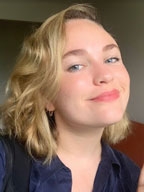Graduate Student Ambassadors
Speaking with a master’s student ambassador is a great way to get a previous student’s perspective on the Language Schools graduate experience.
If you would like to connect with a student ambassador to ask questions, please contact Eman Hayyat, Arabic School Assistant Director, at arabicschool@middlebury.edu.

Theodosia Rossi
Hometown: Cambridge, United Kingdom
Program: Master’s Four Summer option
Current: University of Cambridge, PhD, Asian and Middle Eastern Studies, 2024
What surprised you about your experience at the Middlebury Language Schools?
I was surprised by how positive and collaborative the language learning environment was. Learning a language can be stressful, and the immersive aspect of Middlebury is intense for obvious reasons. That said, the teachers go above and beyond to provide a safe and encouraging setting for students to practice, make mistakes, and learn. Students are also incredibly supportive of one another, which creates a really wonderful group dynamic.
Please describe how your language skills improved due to your studies at Middlebury. How are you currently using or planning to use the language you studied in your daily life (job, personal, etc.)?
Middlebury has helped me to improve my language skills across the board, providing an excellent foundation in grammar and translation, as well as many opportunities to practice speaking, reading, and writing. I currently use Arabic in my research as a doctoral student at the University of Cambridge, where I focus on the history of mental illness and healthcare in Egypt.
Describe a typical day at Middlebury.
In brief, I would describe a typical day at Middlebury as busy! It’s a bit different for master’s students than for students in the language program, but the main elements are the same: classes, communal meals, and events – all in Arabic, of course.
I usually wake up early and head over to the dining hall for breakfast, where I’ll chat with other students for half an hour before heading off to class. This past year, I had classes the whole morning, finishing up right before lunch. These classes are usually small seminars, based on active participation, lively discussion, and student presentations. After class, I like to take a long lunch break, as it’s a great opportunity to unwind a bit and to chat with fellow students and teachers. I think that mealtimes are almost as important as classes for language learning because you can really practice speaking and listening in a more natural and low-key way. After lunch, I usually head out to a coffee shop or to the library and start my homework for the day, and then break for a walk or run right before dinner. If there’s an event at night, I’ll attend that, whether it’s a lecture, movie, or live performance. After the event, it’s then time to get ready for bed so I can start the whole process again the next morning!
What other language learning opportunities have you had? How would you compare this experience to Middlebury?
I have studied Arabic at a range of universities and language centers, both in the West and in the Middle East. I really don’t think I can compare the Middlebury experience to anything else. The teaching is top notch, and the amount of learning you can cram into the six- or eight-week summer session is almost unbelievable. I’m incredibly grateful for the chance to have been able to attend Middlebury for three summers now – learning Arabic has enabled me to do the work that I love and brought an indescribable amount of beauty and joy to my life.

Estevan Sanchez
Hometown: Parlier, California
Program: Master’s Four Summer option
Current: Associate Governmental Program Analyst at California Department of Financial Protection and Innovation
What surprised you about your experience at the Middlebury Language Schools?
What surprised me most about Middlebury was the caliber of its instructors and students. Through the past three years I have taken courses in a variety of subjects, and I can confidently say that the instructors are specialists and leaders in their disciplines. The graduate student cohort, as well as those in the regular program, are highly determined, focused, and diverse. Both the instructors and students create the needed environment to not only study Arabic, but immerse oneself in it.
Why did you choose to study at the Middlebury Language Schools?
I choose the Arabic MA at Middlebury because it is the perfect fit for my professional and personal goals. The program’s design where it pools Arabic instructors from a wide variety of specializations and institutions, such as: Middle Eastern Studies, History, Second Language Acquisition, Linguistics, and Translation makes it so that students are surrounded by experts who have diverse experiences using the language. For example, I am interested in teaching, and developing curriculum to reflect the reality of the Arabic language via social media. Nader Morkus, who focuses on teaching Arabic as a second language, has taught courses directly related to growing trends in the field by focusing on technology in the class room, use of social media, and writing Arabic dialects. Second, I choose Middlebury because the program is entirely in Arabic! All discussions, assignments, readings, and presentations are in the target language which prepares students for their area of specialization. Third, Middlebury’s Arabic school provides generous funding which has made my education possible. I will forever be grateful for the opportunity that has been given to me! Lastly, the program’s structure of completing the degree over four summers allows me to pursue my passion while giving me the flexibility to work during the year or participate in other opportunities.
Please describe how your language skills improved due to your studies at Middlebury. How are you currently using or planning to use the language you studied in your daily life (job, personal, etc.)?
What you learn in Middlebury’s Arabic MA program will apply directly to your professional goals whether that be teaching, working for a government agency, social work, translation, international development, or furthering your education in a PhD program. The intense nature of Middlebury allows one to fully immerse themself in the language and their area of focus. I have learned specific terminology, latest methods related to teaching Arabic as a foreign language, conducted research, and designed learning materials. I have no doubt that following my graduation I will be well prepared for my career in teaching Arabic and publishing work in Arabic related to second language acquisition.
What other language learning opportunities have you had? How would you compare this experience to Middlebury?
I have studied Arabic with a variety of programs, such as: the Critical Language Scholarship, Gilman, Fulbright, and the Center for Arabic Study Abroad. I can confidently say that although my previous experiences have prepared me for graduate studies in Arabic, Middlebury’s Arabic MA has exceeded my expectations. I believe the instructors and environment are what make it the premier program for those who want to immerse themselves in the language. The strict language policy, which I have noticed in other programs is not entirely enforced, is monitored at all times. All program participants are required to work with others if they want to improve, whether that be collaboration on school work or just conversing over a meal. The program sets high standards for its participants as the instructors are devoted to assisting them in anyway possible. It never ceases to amaze me that I witness students with zero to no Arabic start the program and make great strives. If someone would ask me, what would I have done different in learning Arabic? I would say probably only one thing, and that is have studied in the regular Arabic school program. It is truly a golden opportunity, and those who decide to join will not regret it!
